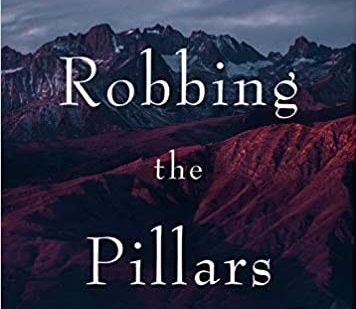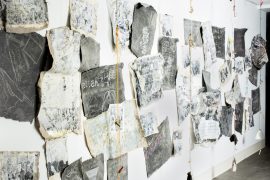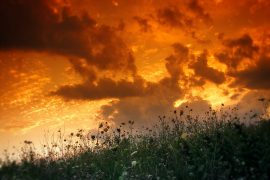We often talk about books being shaped by the times in which they were written, but books are also shaped by the times in which they are read. On March 7, 2020, Michael Garrigan emailed me to ask if I would review his forthcoming poetry collection, Robbing the Pillars (Homebound). I had a number of things on my plate, but I thought I could finish a review by the release date, so I agreed. I did not know on March 7 that I would not leave my house for three months except to go to the dump, and how hard it would be to write during that time. In the time of isolation—which has now become a way of life—the trees, the fields, the creek surrounding my house became my world. I felt more strongly than usual the bond forged between humans and landscape, and this idea appears, in one form or another, in almost every poem in Robbing the Pillars.
The collection is broken into three sections: Dirt, Water, and Rock. These section names indicate the collection’s concerns with landscape, natural processes, and geological spans of time. At first glance, humans seem present primarily in the garbage, mines, and pollution they leave behind on the otherwise majestic earth. Garrigan’s poems show the influence of poets like Gary Snyder and Joe Wilkins, and I was reminded, too, of the contemplations of nature that occur in many haiku, but the strongest poems in this collection strike out in a slightly different direction by bringing in human scales of memory and time, biography, and the idea that landscape creates people just as much as people create the landscape.
The first two poems (“Ecydysis” and “Curve of the Klamath”) run in the vein of the above influences: detailed observations of nature with strands of contemplation and philosophy, though Garrigan is more scientific—and perhaps less Romantic. These poems don’t shy away from terms rooted in geology, ecology, and biology, and they also don’t avoid blunt descriptions of human traces on the landscape.
Big rock beds scorched thin brown, dusty.
A finished shedding—a discarded refrain
a new first line a stutter step
breath, a deep rhododendron bloom, a new koozie.
These poems are reminders that the natural world doesn’t need to do anything beyond existing; it is beautiful even when damaged, even when degraded. It is beautiful in its facts: the composition of rock, the processes of change and metamorphosis.
For the most part, Garrigan’s poetic style is fairly straightforward, but he has a gift for quirky yet precise word combinations. In “Ecdysis,” for example: “listening to the universe / whisper on wavelengths of brooks, licks, runs, and kills.” In a later poem, “Twin Sisters Trail,” the mountains are “swept-old rolling Appalachians,” and in “Start of Season,” the speaker describes “cutting winter-downed trees / to a tarn tacked to timberline.” The sounds and meanings are dense and evocative.
The third poem, “Fat on Loss Potential,” gives the first hint of the ways Garrigan defines a more personal aesthetic, as the speaker contemplates younger self versus current self, and the ways age decreases the willingness to risk discomfort or loss:
We were too skinny to hold that adult fear
of mortgages insurance phones bills commutes
[…] I’m not sure I’d make that climb, now.
Too dangerous. Too slick.
Moments of personal reflection are rare in this collection, which is more focused on landscape and environmental commentary, but these poems are strongest at their most human: when they occur in the landscapes that have personal and narrative connections to the speaker; when they deal with the facts of growing older, with family history, with friendship. The more personal poems provide greater stakes for me as a reader, stakes that are absent from poems comprising only nature imagery. Yet none of the poems would be possible without the landscape that anchors them and makes sense of who the speakers are.
“Anthracite Country,” one of the later poems in the collection, voices the central theme of Robbing the Pillars and also shows Garrigan at his most poetically complex. In this poem that alternates between prose and verse, the speaker tells parallel stories that take place in the small mining town of Shamokin, Pennsylvania. The poem begins in the present and moves into the past as both the speaker and a companion (“you”) walk through the town. Garrigan chooses vivid details that convey the spirit and feel of Shamokin: “a girl trying to ride her bike across [the tracks] so she doesn’t fall into the sharp side gravel,” or “back in the day when they heard a Prohibition Agent was coming F&S Brewery would open all their valves for all their tanks and there would be a three foot head of beer on the creek as it ran through town.”
And then, my favorite moment in the poem, where past and present collide—and four lives collide—as Garrigan blurs the narratives with an almost filmic gesture of intercutting between the companion’s father and the speaker’s own father as they both climbed the gravel of the mines. Here, Garrigan uses form in a way that echoes his theme of the movements of time (past, present, human, geological). The poem itself takes the reader back and forth in time and space, describing obliquely the dangers of room and pillar mining, the process from which this collection derives its title. In room and pillar mining, miners excavate a “room” underground, and remove ore. The “pillars” are columns of earth left in place to keep the excavation from collapsing—nonetheless, it does sometimes—collapse. The poem relates the speaker’s grandfather’s childhood:
he was one of the boys that would rob the pillars, setting the explosives since he was small enough to fit those tiny spaces deep in the rock
In this moment, a human is literally wedged into rock like a vein of ore, expressing one of Garrigan’s central claims, which is that humans don’t simply interact with the landscape, they are the landscape. When the speaker of “Anthracite Country” says “These are our headwaters,” those headwaters are human and geological. Humans are rock. They are water. They are tree. Often, as in this poem, they are just as abused as the land they mine, or as Garrigan puts it in “Persist”: “iron oxide death to a watershed” is not unlike being trapped in the mines, waiting to see if you’ll die there as the rock collapses around you.
I often think about the moments before the moments. Because I grew up in Hawaii, this often takes the shape of wondering what people were doing on the morning of December 7, 1941. It was early on a Sunday, but people were probably letting their dogs out, getting ready for church, making food. They had no idea what was about to occur. As I began this book, I didn’t know a pandemic was rushing full speed toward the east coast. I didn’t know the country would explode in other ways as well.
Strangely, the considerations of race that burst forth after shutdowns and quarantines, particularly the disproportionate burden some people bear due to who they are, also appear in this collection. In “Guardian of the Mountain,” the speaker relates doing some trail work on the border. A fellow trail worker, Dave, says he carries water for migrants he runs into. Dave and the speaker encounter someone trying to evade border patrol, and the poem closes:
We give you water and trail mix and beef jerky.
Did you make it? Or are you bloated gray green?
Are vultures circling overhead, hide beetles eating
the hard dried tissue? Did you find your father?
You keep walking north.
We have trail to cut.
When I first read the closing lines, I wondered if I had misunderstood. Then I realized I hadn’t. I thought about my own experience of visiting a friend near El Paso, and how looking out across the border to Ciudad Juarez was like being punched in the gut with guilt for being an American. The boundary was striking not because of a fence or an intentional marker, but because the buildings on the Ciudad Juarez side were tiny, crammed together, and in disrepair. There was clearly so much more wealth in El Paso. I remember, too, being stopped by border patrol, the way they peered into the car to see who was there. They saw a white person and me: indefinite race, but with a face everyone trusts. It was routine, yet not routine. Reading the closing of this poem, I thought what a privilege it was to wonder if someone had made it, what a privilege it was to be able to resume work as if nothing had happened, while the person you had met might have died. It is not a concern the poem addresses.
The above is a purposeful critique of voice and perspective—but Garrigan relates other stories that show an understanding of the ways particular groups of people bear the consequences of capitalism, class, and environmental destruction. Garrigan handles the world of Rust Belt miners, for example, with confidence and familiarity. When he makes the claim that humans are the rocks, the trees, the fish, the rivers, I believe him wholly. I feel that it is so. My reading of this collection was indelibly shaped by the time during which I read it, and that manifested in different ways, from thinking about race and class to thinking about the ways in which, separated from other humans: I am the rock. I am the tree.





